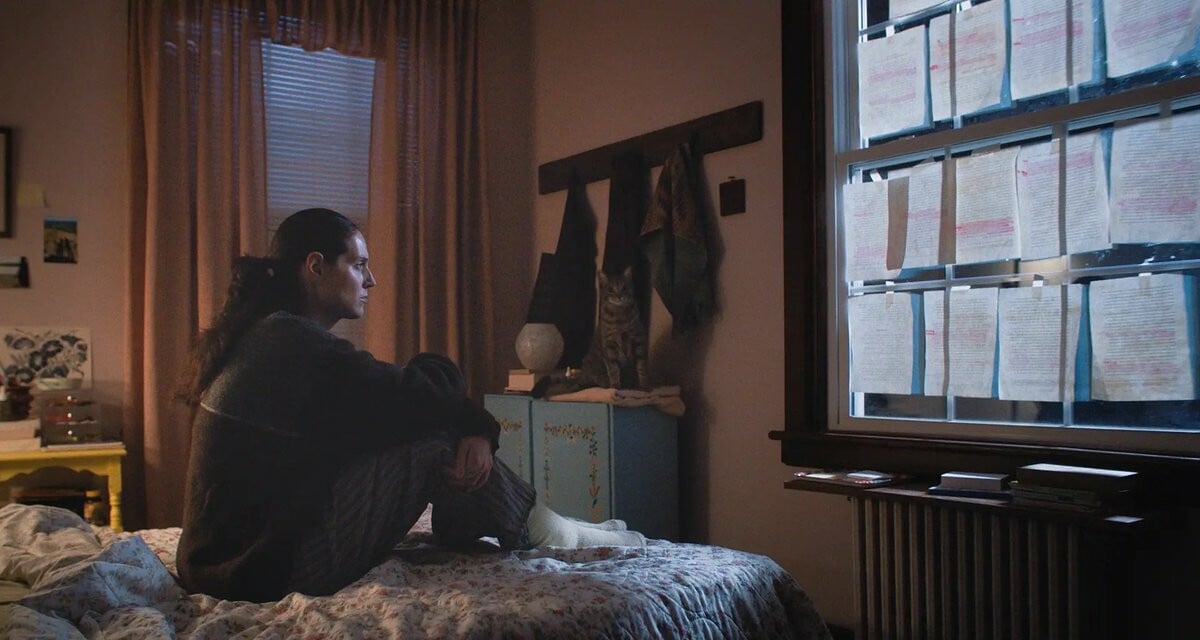By Elisavet Tsakalidou,
“Sorry, Baby” (2025), Eva Victor’s debut film, is a perfect portrayal of the female experience of trauma and sexual assault. Focusing on Agnes (Eva Victor), who is an English Literature PhD student in her twenties, the film explores her experience after her thesis supervisor (Louis Cancelmi) sexually assaulted her during one of their academic meetings. What is very important and different from many other movies or series that tackle the same issue, is that the film does not focus on the event itself- which is not even shown- shifting the focus to its effect on the protagonist.
The scene exactly after the assault follows Agnes describing what had happened to her best friend/roommate Lydie (Naomi Ackie), while sitting in the bathtub. While she does not name the event as “rape”- a label society often pressures survivors to use- she describes in clear detail exactly what and how it happened, leaving the audience totally breathless and speechless. Victor’s expressions, pauses and small movements really capture the essence of the scene and her dual role as director and actor creates a strong sense of intimacy and control of the story. At the same time, Lydie’s deep support and understanding towards Agnes highlight one very important thing: countless women have experienced similar assaults- that also have to do with power relationships- and receiving this kind of support is essential for the healing process, since the system completely fails to support them.

Victor powerfully highlights institutional failure in two key scenes. The first one follows Agnes and Lydie visiting the hospital to undergo a rape kit, when a male doctor treats her coldly and implies that her showering beforehand may have destroyed evidence. The next scene, which is by far one of the most tragicomic scenes in the whole film, follows Agnes visiting the HR of her University to discuss the incident. The two women she meets with appear to be sorry for her and claim they truly understand her but clearly state that they cannot press charges since Professor Decker has already resigned. Simply by taking a look at the statistics from USA’s Department of Justice, it is evident that women chose not to report mainly because they do not trust the system (only 310 assaults out of every 1,000 are reported). What Eva Victor showed through these scenes is a very realistic, sad and harsh situation women face all over the world. If the systems meant to help survivors have been proved to consistently fail, then Sorry, Baby poses an urgent question: Where are they meant to turn?
In terms of reframing trauma representation in cinema and TV, the film treats the subject with the focus on the character’s inner world. The assault scene is not visualized; the event is referred to as “The Bad Thing” and the character is not portrayed as a victim whose life revolves around the assault. This choice is very significant for specific reasons. It does not draw the viewers’ attention on how it happened; it just allows the protagonist to share her own experience, emotions and thoughts on it. The non-linear timeline that consists of five different chapters-years gives the space to explore how Agnes is processing her trauma and suggests that healing is rarely linear. Through the vignette-style narration, we as viewers are able to dive into her inner thoughts while also witnessing her moving on from this tragic event, taking smaller steps, like adopting a stray cat to keep her company, or even bigger ones like beginning to work in the same position as Professor Decker.
Through all of these choices and narrative techniques, Eva Victor has offered a fresh and deeply feminist perspective. She has created a film that is solely based on the healing process, rather the event itself. She neither names the act nor she creates another narrative of a woman’s pain, and she definitely does not give the viewer a clear-cut answer to what healing is (or what it is supposed to be). Victor sharply criticizes the institutions and their failure through the comic and humorous elements of the film while also emphasizing the power of female friendships. By choosing empathy over exposure and rejecting victim narratives, she has created a film that returns power to survivors and allows women to speak on their own terms. And for that, we owe Eva Victor not just thanks, but recognition for delivering one of the most feminist films of the year.
References
- Sorry, Baby is a smart film about sexual assault and it’s here at just the right time. The Guardian. Available here
- Eva Victor on Finding a Gentler, Funnier Vocabulary for Trauma in Sorry, Baby. TIME Magazine. Available here




